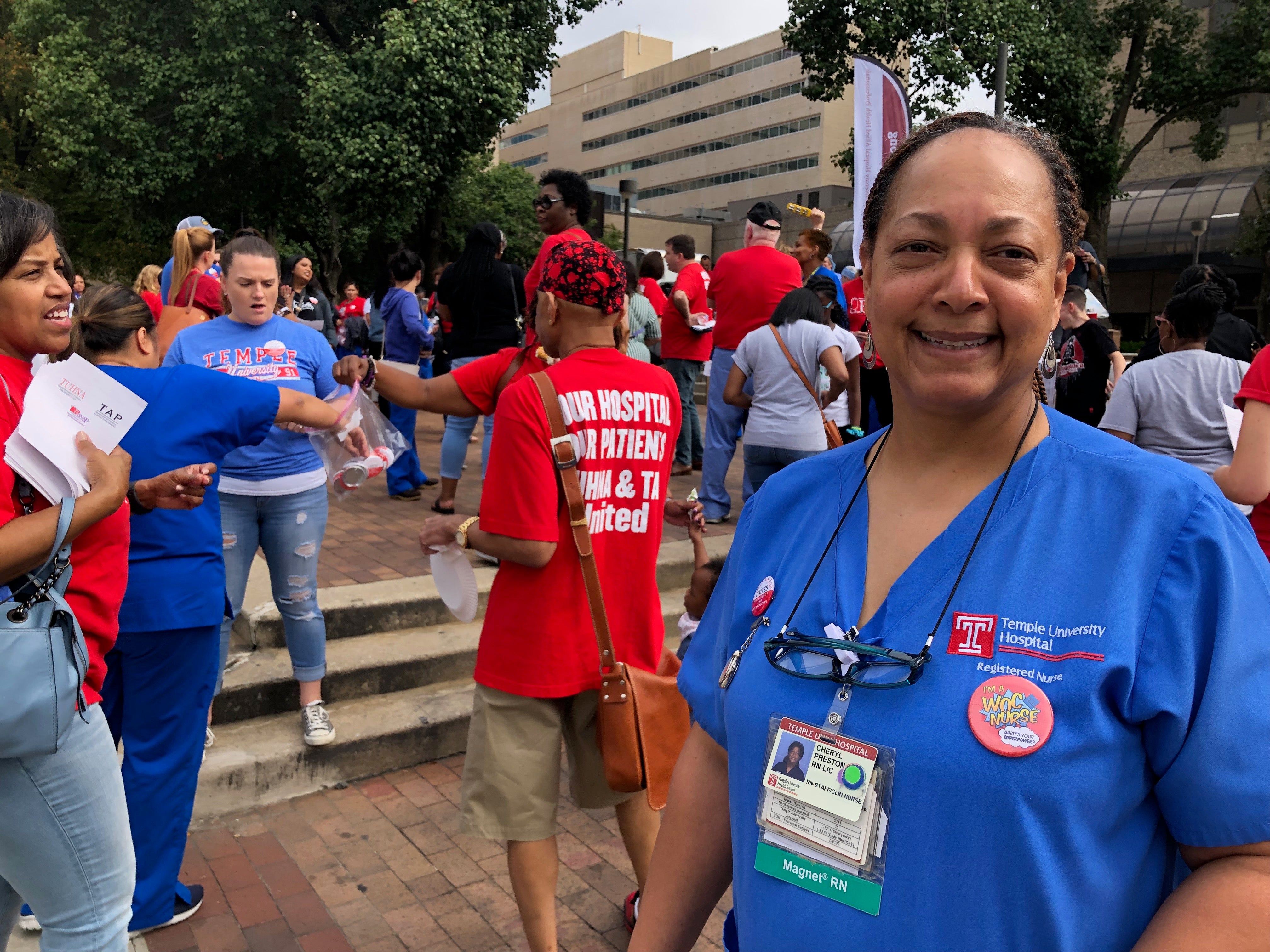Fearing a sale, nurses at Temple University Hospital want to protect their jobs
The workers’ top priority is adding successorship language to a contract. That would require any new owner to honor the union accord already in place.

Workers rally outside Temple University Hospital on Tuesday. (Nina Feldman/WHYY)
Hundreds of nurses and other union workers rallied outside Temple University Hospital Tuesday to pressure hospital management to meet their bargaining demands. The union, which represents 2,000 nurses and allied technical workers, has been negotiating with Temple management since July, and its contract expired at the end of September.
The biggest priority for workers is adding successorship language. That would require any new owner of the hospital to honor the union contract already in place.

Workers say ensuring the contract would carry over is essential, given the overall climate of shake-ups in the health care industry in the city.
“As everyone knows, there’s all sorts of mergers and sales going on in this city,” said Mary Adamson, who has been a nurse for 25 years and serves on the bargaining committee at Temple. “We have fought as a union workforce for almost five decades, and these contracts build on each other. So if another organization comes in and takes over, our contract would be null and void and we’d have to start over again.”
Adamson said management would not budge on the successorship language, arguing that it could dissuade any potential buyer and quash a deal.
Temple Health did not respond to a request for comment.
While no change of ownership has been officially proposed, workers interpret a number of recent move as “hints” that such a deal could be in the works.
As a part of a restructuring effort announced last year, Temple Health is in the process of selling its Fox Chase Cancer Center and its interest in Health Partners Plans, which manages Medicaid and Medicare benefits, to Jefferson.
Both the insurance unit and the cancer center were profitable assets of the health system’s operations, leading some to question why the hospital would sell off its money generators if not in preparation for a sale.
“There’s all this discussion about ‘oh, we’re an orphan, because we’re a safety-net hospital not connected to this broader network,’” said a spokesman for the Pennsylvania Association of Staff Nurses and Allied Professionals (PASNAP), the nurses union. “Well, orphans should be adopted, right? That’s the theory behind it.”
The North Philadelphia hospital serves many patients on public insurance. In the absence of a publicly operated facility in the city of Philadelphia and with the closure of Hahnemann University Hospital this summer, by default Temple has become the public hospital in town.
Temple Health chief executive officer Larry Kaiser announced last month that he would step down effective Sept. 30. Taking his place as interim CEO is Stuart McLean, a restructuring expert with health care consulting firm Alvarez and Marsal whose specialties include mergers and acquisitions.
On a call with stakeholders last month, Kaiser indicated that the hospital was doing well financially.
“The health system is stronger than any time in recent memory,” he said on the call, indicating that the hospital has enough cash on hand for 85 days, up from 72 last year. Kaiser said that the developing relationship with Jefferson would lead to opportunities for future collaboration.
In addition to the successorship language, Temple’s nurses are pushing for standardized nurse-to-patient ratios.
“Some people have mental health issues, dementia and things like that, that might make them at a higher risk for falls,” said Cheryl Preston, who has been a nurse on the hospital’s medical-surgical floor for 14 years. “If we have less patients and we can spend more time in each room, we can keep check on things like that.”

Carlos Aviles, president of Temple Allied Professionals, a subcommittee of PASNAP, said a strike is a last resort, but he invoked it as an option. The union contract included a no-strike clause, but because it just expired, a walkout is on the table.
“That last strike cost them $30 million,” he told a cheering crowd at Tuesday’s rally. “We aren’t afraid to cost ‘em another 30.”
Nurses at Temple last went on strike in 2010, walking off the job for 28 days.
WHYY is your source for fact-based, in-depth journalism and information. As a nonprofit organization, we rely on financial support from readers like you. Please give today.





